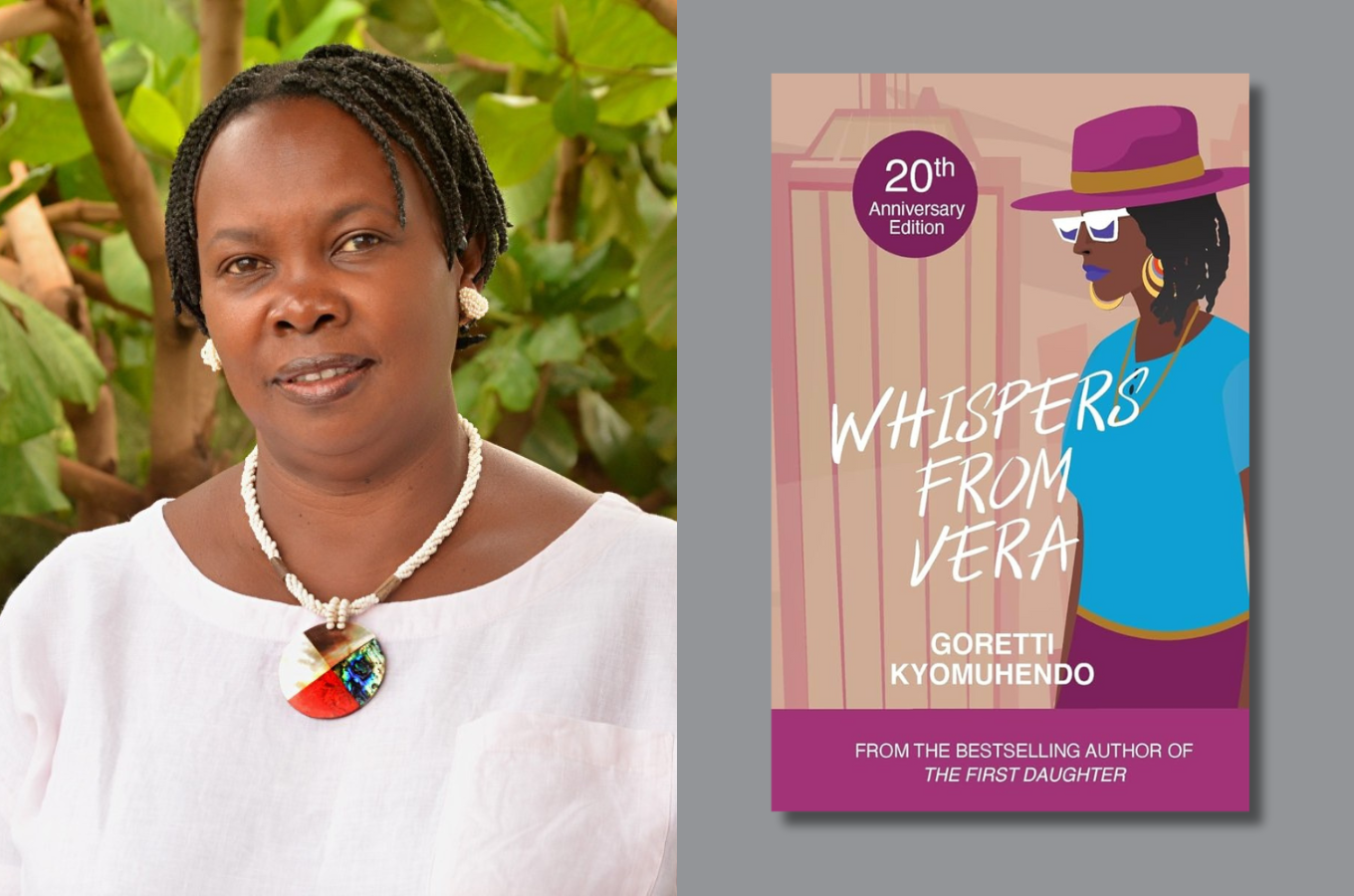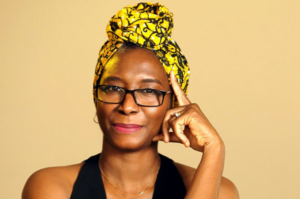
Ugandan novelist Goretti Kyomuhendo reissued her 20-year-old novel Whispers from Vera in August 2023. This republication was greeted with much excitement from readers and new audiences. In this conversation with Ugandan poet and writer Ber Anena, Kyomuhendo discusses her three-decade writing journey, running a literary organization, and her dreams for the future of literature in Africa.
Kyomuhendo is the founding director of African Writers Trust and author of four novels: The First Daughter (1996), Secrets No More (1999), which won the Uganda National Literary Award for Best Novel, Waiting (2007), and Whispers from Vera, republished in August 2023. She’s also the author of the Essential Handbook for African Creative Writers (2014), several children’s books and short stories, including “Lost and Found”, published in New Daughters of Africa: An International Anthology of Writing by Women of African Descent (2019).
She holds an MA degree in Creative Writing from the University of KwaZulu, Natal, South Africa and is the first Ugandan woman to receive the International Writing Program Fellowship at the University of Iowa. Goretti is a founding member of FEMRITE – Uganda Women Writers’ Association and Publishing House – and served as its first director for 10 years.
***
Ber Anena
How similar or different has the publishing experience been and the reactions to the new edition of Whispers from Vera?
Goretti Kyomuhendo
The main differences lie in the appeal and reach of this new edition in comparison to the first. When the novel first came out in 2002, its marketing and sales were largely focused on Uganda. Nearly all the 2,000 copies that were printed were sold in Uganda. You have to remember that at that time, social media and other online platforms were not easily available on the continent to spread the word or offer E-commerce facilities.
This new edition has attracted a global readership and appeal. Currently, the novel is being distributed and marketed through various digital sales platforms and print-on-demand options in Europe, Canada, the U.S., Japan, China, Africa, and other Commonwealth countries.
Additionally, the new edition has been published in different formats. It came out in hardback and has been published as an ePub, and will soon appear as an audiobook and in paperback. The first edition only came out in paperback.
Ber Anena
The novel begins with the protagonist telling the reader who she is: “My name is Vera.” What is your relationship to naming as a woman, and an African woman? Why was it important for you that the novel opened with that line?
Goretti Kyomuhendo
I wanted to center the Ugandan woman’s experiences, voice, and perspective. In the opening lines, Vera announces: “My name is Vera. I’m twenty-nine years old. I’m the Product Manager at TN Telecoms Company, here in Kampala …” Vera is sounding a clarion call to the reader to sit up and listen and to focus their full attention on what she has to say because it’s important. The reader does not have to agree with her, but Vera has the right to express her lived experiences and perspectives. This is meant to ‘decenter’, so to speak, other dominant voices and perspectives, which sometimes mute out the voices of women like Vera’s. It was also important for Vera to speak in her own voice, which is why the novel is written in the first-person point of view.
Ber Anena
Whispers from Vera has a subtle but persistent feminist thread. If we are talking real life, how would the Vera of 2002 differ or relate to the Vera of 2023 in terms of the place women occupy in the world today?
Goretti Kyomuhendo
In some ways, I think the Vera of 2023 is more empowered and assured and is more aware of what she wants out of life. She is living in her times, just like the perspectives of the Vera of 2002 mirrored the start of the millennium. For instance, the ‘new Vera’ realizes that to advance her career development ambitions, she will have to improve her academic qualifications and work experiences, just like all other young women are doing, as she notes: “Everywhere you look these days, young people have already acquired ACCA’s or CPA’s”; which prompts her to sign up for an online course at the Chartered Institute of Marketing. This was not the case for the ‘old Vera’ in 2002. Later, the Vera of 2023 has to make some tough decisions when it comes to advancing her career further; again, that seems to be the trend in today’s world. Something else that comes up for the ‘two Veras’ is the issue of the so-called reproductive window for women. Whereas the Vera of 2002 was concerned about not having had a baby by 30, the Vera of 2023 is happy (and confident) to push the imposed timeframe to 40, before she can have another child, as many young women are doing now, because they would rather focus on their careers first.
Ber Anena
Some of the things I love about the novel are the humor you deploy, the fast-paced narrative, and how you ground the story in Uganda’s storytelling/conversational lingua. Every time Vera exclaimed banange! Wanji! Mbwenu! etc., I found myself chuckling but also moved by how appropriate and rich those expressions made the reading experience. Why was it crucial for you to ground this novel in some Ugandan-ness?
Goretti Kyomuhendo
In the first edition, I used a glossary to explain the non-English words. At the time, it seemed appropriate. When I was reworking the second edition, I noticed a shift, in the way, as Ugandans, we had increasingly become comfortable in the use of our local languages; or how we liberally incorporated local phrases and words into the English language. We have even gone as far as appropriating the English language to create our own – the non-standard, functional version we call Uglish. To me, this signaled an acceptance and embracement of our cultural identity and heritage; a self-love, which is really a beautiful thing. If you look at advertising messages by the big corporates in Uganda today, such as banks and telephone companies, you will find that many of them use our local languages to deliver their messages. Hence, ditching the glossary and incorporating non-English words in the narrative was the right thing to do for this edition.
Ber Anena
Vera is a very multi-faceted character. She’s a focused career woman and a dedicated partner and later wife and mother. But she’s also quite naive when it comes to navigating relationships with the men she dates. She wrestles with cultural expectations, the fear of not getting married on time, and whether she’ll please her in-laws. How was the experience for you creating this character?
Goretti Kyomuhendo
Creating Vera was an enjoyable experience. I laughed with her and at her. I scolded and applauded her. I learned from her. I wouldn’t necessarily regard Vera as naïve. My goal was to create an all-round character, whom many of us could relate to. Vera shares with us her wisdom, mistakes, and successes in a candid, sometimes provocative manner. Her fears and anxieties as she grapples with the dynamics of cultural expectations vis-à-vis modern-day lifestyle are real for many young, middle-class Ugandan women. I also wanted to create a strong woman, capable of disrupting and challenging what is normally considered as ‘normal female behavior.’ In creating Vera, I was also flirting with the concept of the proverbial, Mr. Right, or Prince Charming; and the notion of everlasting love. How realistic is it in today’s fast-paced, modern world? Vera opens our eyes to the highly-competitive, cut-throat corporate world, where both she and Eric work. Is romance possible under such circumstances? Is the craving for everlasting love, and of a ‘Mr Right’, a reality, or a mere theoretical postulation? These are some of the issues I wanted to interrogate.
Ber Anena
I love the role that other women characters play in the novel, for good or otherwise. I’m particularly interested in Halima and Jacinta, who didn’t go far with education but are the go-to people for advice on relationships and life for the other high-flying women in the workplace, such as Vera and her friend Sheila. Why was it important that the reader met Halima and Jacinta too, and not just Sheila?
Goretti Kyomuhendo
Halima and Jacinta are on the (extreme) opposite spectrum of Vera’s life, and that of her friends, like Sheila. I like to consider Halima and Jacinta as the ‘voices of reason’, regardless of whether you agree with their ‘pedestrian’ views, as Vera puts it. Halima is the realist and pragmatic one. She brings Vera down from her high horse; and, as it turns out, Vera tends to agree with Halima in the end, or at least do exactly what Halima had suggested from the beginning. These two characters, Halima and Jacinta are there to remind us that even with education, a corporate job, and status, in many ways, society still controls women – through the dictates of tradition and culture – and how much they can achieve. In the end, the issues affecting the urban woman also affect the rural and less-educated. And the educated, urban, modern-day woman, still has to push back the boundaries set (by society) to succeed.
Ber Anena
You have been writing for close to three decades, right from 1996 when you published your debut novel, The First Daughter. What has been the biggest transformation in how women are portrayed in fiction by Ugandan or even African writers?
Goretti Kyomuhendo
When I published The First Daughter in 1996, my main motive was to question men’s privileged position in society. The story talks of a daughter who falls pregnant while still in school. She is expelled while the boy who made her pregnant continues with his education. There’s a mother who is barred from eating certain foods, such as eggs, fish, and chicken based on her gender. A grandmother who was not allowed to choose her own husband. When I first published Whispers from Vera in 2002, and earlier, Secrets no More in 1999, both novels with explicit sex scenes, there was an uproar among many Ugandans. Now we have novels that speak on sex issues liberally, not only in Uganda but the continent at large. This is not to say that we have achieved the equilibrium. There’s still plenty of ground to cover.
Ber Anena
What is the one major change you wish to see regarding the production, sale, and distribution of novels, poetry collections, and creative nonfiction work from Uganda and the continent as a whole?
Goretti Kyomuhendo
In terms of production, I would like to see more professionally produced books from the continent. I think this will happen when we start regarding books as products, which need to be packaged to a high quality to enhance sales. We need to invest in quality paper and cover designs and skill our graphic designers who deal with text layout and all that. A good product.
I would also like to see books moving across the continent. For example, if I’m a reader based in Uganda, how can I access a novel published in D.R. Congo, Somalia, Djibouti, Sudan, or Ethiopia? Geographically, these countries are close neighbors of Uganda but moving content across the continent is hindered by a myriad of restrictions and limitations, such as trade barriers. Importing books into Uganda, for instance, attracts taxation. In addition, we lack a common currency between African countries to facilitate and make trading in books easier. Underdeveloped transport infrastructure is another hindrance, as is the lack of a common language, which continues to fragment the continent. Trading in rights, such as translations, E-commerce, and audiobooks could help create additional revenue for both authors and publishers and ease some of the factors that hinder the physical movement of books from one location to another.
Ber Anena
Why should a person who read Whispers from Vera in 2002 read the new edition? What do you hope they’ll take away from the novel?
Goretti Kyomuhendo
The story in Whispers from Vera follows the life of Vera, a high-flyer, corporate worker, who is determined to have it all: a husband, children, and an illustrious career. The narrative centers on Vera’s lived experiences, and how she navigates the highs and lows of motherhood and wifehood as a middle-class, Ugandan, career woman. The story is set in Kampala in the 2000s. This is an old story, indeed, but unfortunately, the issues raised then are still relevant today. These are the realities for many women, not only in Uganda but also in Africa and elsewhere. It’s a story that will resonate with many. For those who read the first edition, this is a reworked and ‘refreshed’ one, with a few additions and subtractions, though the main story plot remained the same.
Ber Anena
The African Writers Trust which you founded and run, has been instrumental in nurturing upcoming Ugandan writers and bringing together writers from the continent and the diaspora. What does the future look like for our literature and literary connections?
Goretti Kyomuhendo
At the heart of what we do is to bridge the geographical spaces that divide African writers on the continent and in the diaspora. When we started in 2009, nearly 15 years back now, it was a big challenge for Ugandan readers to access books authored by African writers in the diaspora. This is one area we have successfully addressed. Today, you can order from our online Bookshop for a title by a writer in the diaspora, and it will be delivered to your doorstep if you are in Kampala. We also distribute upcountry and, in the East, and the Horn of Africa sub-region. This connection through books is a crucial one.
Through our pioneering literature projects such as the short courses we offer in creative writing, editing, and publishing, online manuscript assessment, and The Writers-in-Conversation series, we have built a strong portfolio as modifiers of the literary landscape on the continent and connected hundreds of writers and publishing professionals on the continent with the ones in the diaspora.
Looking to the future, we are working towards finding a workable solution for financial sustainability, to remain relevant as an enterprise and continue serving our intended audience. Like many small arts organizations on the continent, we were greatly affected by the COVID-19 pandemic and the subsequent measures to mitigate its spread. The recent North-to-South funding trends which require exploring different resourcing models that better support independence and sustainability have also affected our operations.
Ber Anena
It was great chatting with you, Goretti. Thank you!
***
Buy Whispers from Vera here: Amazon | African Books Collective









COMMENTS -
Reader Interactions